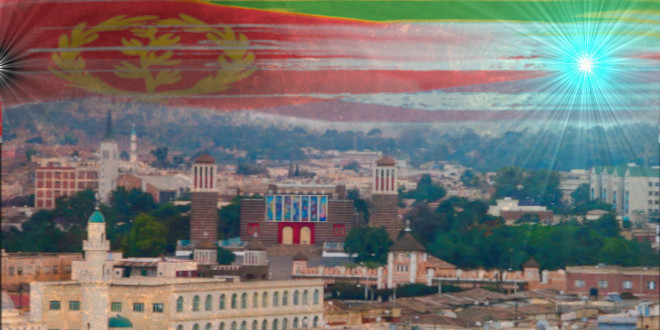Eritrean Case: Theory of Internal Colonialism

Before we jump into the discussion of internal colonialism, it’s necessary to pave a way for it with an overview of formal/external colonialism due the close relationship and commonalities between them.
A great number of authors and writers – including Eritreans – dealt with external/formal colonialism in detail and studied it’s effects and suffering that is caused to the colonised people. That’s because it was an unambiguous, unmistakable phenomenon–they amplified and described it. In fact they described it with the ugliest and the most terrible traits because the colonists relied on the use of violence and force to control people’s breath. They violated their rights and freedoms, trampled on their dignity, seizing their capabilities, plundering their goods, killing their children, and raping their women. They treated them as animals that are used for heavy labour without paying any attention to their health and human condition.
Types of colonisation
Although it revolves around two main types (external & internal), astronomers and some scholars have classified colonialism into four overlapping types:
- Settler colonialism: a people from one nation go off to live in another country where they build settlements, till the soil, and harvest natural resources. The British colonists who made new homes in North America in the 1600s and Australia in the late 1700s are examples of settler colonialism. (2)
- Exploitation colonialism: in contrast, this didn’t require as many colonists to emigrate because the native people are allowed to stay where they were — especially if they could be pressed into the service as workers.
- Surrogate colonialism: a colonial power encourages one ethnic group or groups from the colonized country to take over the land previously controlled by another group. This term was first used by anthropologist Scott Atran to describe the British allowing Zionist settlement in Palestine.
- Internal colonialism: the strongest part of a country might exploit another, less powerful regions or peoples. For instance in Sri Lanka, the Tamil population felt the Sinhalese majority oppressed them — that resulted in a decades-long war between the Sri Lankan government and the terrorist Tamil Tigers group. [sources: Mick, Atran, Sathananthan] (1). We will see if the internal colonialism type can be applied into our country’s (Eritrea) current situation.(3)
When we look at internal colonialism, the authors and writers didn’t give it the level of attention as they did with the external colonialism. The form of internal colonialism we are talking about is a theory that seeks to explain how inequality and domination are maintained in a society when there is necessarily no foreign ruling power.
Nowadays (postcolonial), many countries continue the practice of favouring one group over another, whether it is ethnic, linguistic, religious, regional, or cultural. As a result, we see numerous conflicts being caused in party by dominant groups enacting and enforcing governmental, economic, political, and other social policies that distribute resources unequally among their nation’s members.(4)
What is the difference then, between external and internal colonialism, other than mastering the language of rhetoric in exercising the discourse of revolution against colonialism, or the greed of resistance and facing occupation without substance and against the reality? The killing, imprisonment, slavery, looting, torture and contempt remains the same.
From my point of view the term ‘internal colonialism’ applies to the Eritrean current situation because it covers all the above mentioned elements that make up the term.
It’s no secret that the regime of the ruling group in Eritrea that is restricting the freedom of other sects by undermining their traditions, trade, languages, religion, educational and political systems, and constrains their development.
Indications of internal colonialism in Eritrea
Although the Eritrean society is a multi-cultural, multi-lingual, multi-ethnic and multi-religious society, only one of these components controls almost all the state resources while the crumbs are thrown to the rest of the society.
The manifestations of internal colonialism in Eritrea are:
- The poverty and underdevelopment in some regions within the state, through the creation of a better work environment, providing (as much as possible) the required resources and developing the infrastructure, but not in other regions.
- Establishing a specific culture in a multicultural society such as imposing a specific language (Tigrinya) on a multilingual society, or granting religious privileges to a group in a multi-religious society, such as empowering Christians on Muslim lands.
- Unfair distribution of power which leads to disruption of social development.
- Inequality in educational opportunities by granting more than 95% of scholarship grants to study abroad to the ruling group members, while other ethnicities are excluded even from entering the university though they have the needed entering requirements, on the pretext that the system needs them as teachers of mother languages, and they are sent to the Teachers Training Institute against their desire.
- Unequal job opportunities: Other ethnic groups systematically suffer from higher unemployment rates compared to their counterparts from the ruling group. For example, the number of employees of the ruling group in the state ministries reached 95%,, which indicates that the benefits are distributed unequally. This impact on the labour market is a result of unfair educational opportunities that is mentioned above.
It’s also much more dangerous than formal/external colonialism, because:
Formal colonialism is well recognised globally and it’s no longer acceptable and highly restricted (post-colonial period); its unlawfulness has been included in the United Nations treaties.
While the case with internal colonialism wasn’t broadly defined or widely recognised by the historians and sociologists as it’s in the case with formal colonialism, it’s not universally known and the United Nations Organisation has not yet recognised its existence.
Moreover, formal colonialism is such a wound in the human body, whoever sees it sympathizes with and provides support and advice to the affected. Therefore, it’s much easier to treat and get rid of its effects.
While an internal colonialism is similar to cancer due to its invisibility, others won’t know of its existence, or feel the suffering it causes to the suffering, thus could not offer sympathies, support, or advice.
Even if the colonised raise their voices to explain their case to international community, it may be considered an internal matter or rebellion because the colonists frequently carry out counter-propaganda to conceal the truth, deceive the local and international public, and hide under the garment of patriotism.
Also, unlike external colonialism , it can hide under the cloak of patriotism, deceiving and misleading the masses through revolutionary rhetoric, propaganda focusing on national security. They also fabricate charges of treason, and accuse people of dealing and communicating with the enemy to justify their punishment, their exile or disappearance.
Finally, understanding historical colonialism and its interpretations not only helps us understand the current circumstance and sufferings of some groups within one state–those suffering from internal colonialism as a result of the domination of ethnic, class or religious groups over others, and the deprivation of their rights, freedoms, and inequality. But also it helps us develop a framework that provides a solution to the problem at the national, regional and international levels. Therefore, this issue deserves an attention of sociologists, historians and politicians in order to reach the desired goal – at the lowest cost- to a more egalitarian and peaceful world.
Note: This is for those who believe that Eritrea is a free country because they are unable to distinguish between freedom and independence. And they don’t realize that the citizen of Eritrea was much better off in the era of colonialism than it is now. Be free and learn to say no, when necessary.
___________
(1) D, Dey. “Internal colonialism”. September 2014
2) D Lloyd &P Wolfe. Settler colonial logics and the neoliberal regime. 2015,
3) PATRICK J. KIGER,
4) Marker, Sandra. “Effects of Colonization.” Beyond Intractability. Eds. Guy Burgess and Heidi Burgess. Conflict Information Consortium, University of Colorado, Boulder. Posted: November 2003
5) Lamonte Aidoo, Daniel F. Silva · 2013 · Literary Criticism


Awate Forum